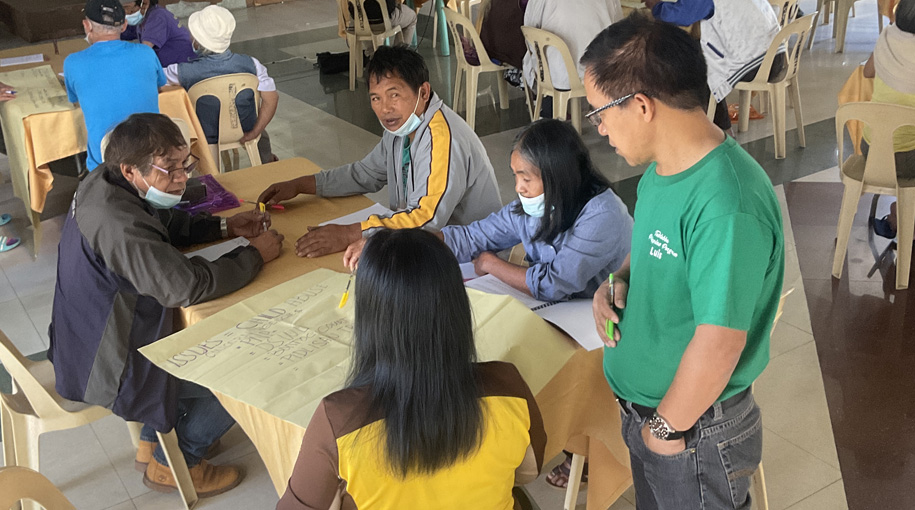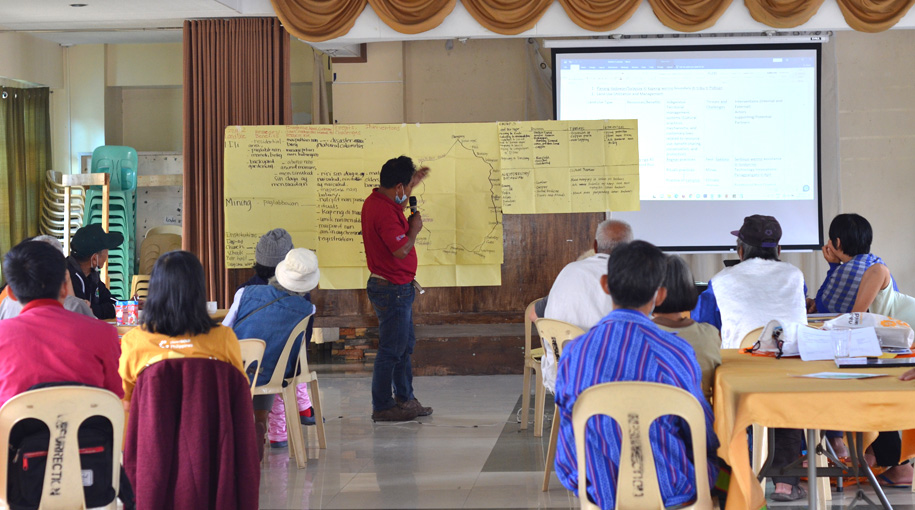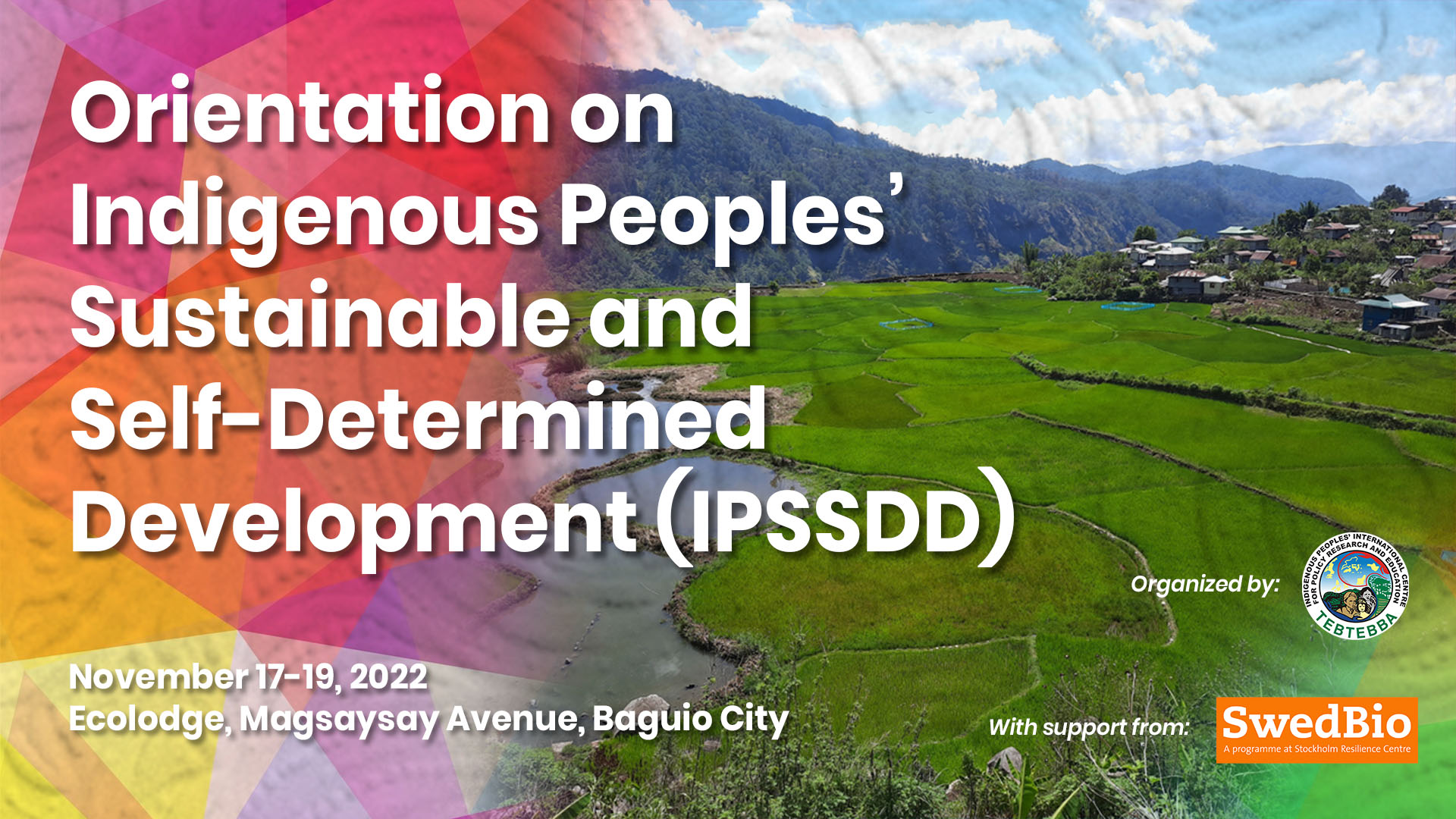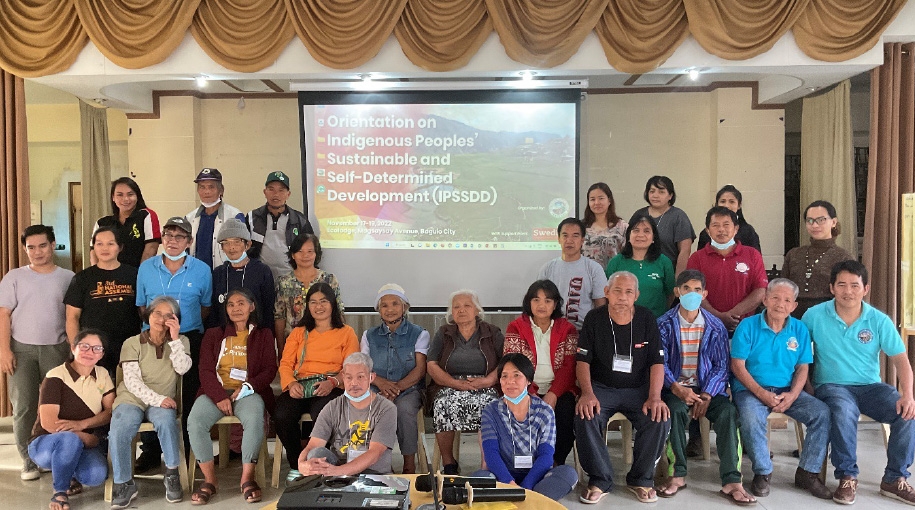"Esa ay main objective nan Tebtebba et nu kasanu ay papigsaen nan umili tapno dakkel nan kumpiyansa da ay mangipapati ay waday karbengan da bilang Indigenous Peoples. Wada’y karbengan da ay mangprotektar as daga da ya am in ay resources ay wada ken daida ya usaren dana ay resources para si paggawisan nan umili." (One main objective of Tebtebba is to strengthen the community to have the confidence to assert their rights as Indigenous Peoples; that they have the right to protect their land/ancestral domain and all resources within their territory and to utilize these resources for the betterment of the community.)
Victoria Tauli-Corpuz, Founder and the Executive Director of Tebtebba, stressed on empowering indigenous peoples so that they may be able to defend their rights during the opening session of the Orientation on Indigenous Peoples Sustainable and Self-Determined Development (IPSSDD) for the Pidlisan Tribe Organization held on 17-19 November 2022 at Ecolodge, Baguio City, Philippines.

Around 25 elders and members of the Pidlisan Tribe Organization (PITO) from Sagada, Mountain Province of the Cordillera region participated in the three-day orientation which aims to elaborate Tebtebba’s integrated and holistic framework of IPSSDD and deepen understanding of its core elements—human rights-based approach, knowledge-based approach, ecosystems approach, sustainable economic sufficiency, intercultural, intergenerational, and gender dimensions, among others.
As a starting activity, the participants were grouped to fill out a matrix where they wrote the current issues and concerns being faced by the community, agencies involved that can help solve the problems, and their recommendations for action. Most of the reported matrices were in relation to environmental issues, revitalization of Indigenous Knowledge Systems and Practices (IKSP), Livelihood, and Human Rights, among others. They also highlighted specific government agencies and Civil Society Organizations which can help them address these issues.
To better understand the five modules integrated in the IPSSDD, facilitators from Tebtebba discussed each module and provided a corresponding activity and open forum for each session.

Florence Daguitan of Tebtebba’s Philippine program highlighted the global multiple crises where she and the participants identified the social and ecological challenges being faced by indigenous peoples and relate these with existing economic, socio-cultural, and political systems of Indigenous Peoples at the local level.
The Introduction to Human Rights-Based Approach was facilitated by Beth Bugtong-Biano, Coordinator of the ELATIA Training Institute and Abigail Kitma of the Indigenous Peoples Rights program where orientation on basic human rights and its principles were given highlighting national and international policies including the Indigenous peoples Rights Act of 1997 (IPRA) and the United Nations Declaration on the rights of Indigenous Peoples (UNDRIP). A group activity on the needs and rights of a person was also conducted.
Activity regarding Land Use, Resources Utilization and Management was then facilitated by Roger Lambino of Philippine Program relating it to the session on indigenous peoples’ traditional knowledge and territorial management systems. Through this, participants were able to determine the different land use types and traditional knowledge within their territory.
Finally, an activity on traditional economies was facilitated by Helen Biangalen-Magata of the Resilience program where participants determined the benefits, challenges, and actions points towards preserving traditional economies. It was highlighted in this said activity that one of the main challenges faced by the community regarding the transfer of knowledge is the lack of interest and participation of the youth sector. They also provided actions points regarding these challenges in order to strengthen and promote traditional economies.
The three-day activity culminated with remarks from the participants claiming that this orientation helped them not just to have a better understanding of their rights but also to plan a way forward to strengthen their community and engage the youth in order to sustain their IKSP.
“Mantraining tako ta way isaa tako ay pagsayaatan din ili tako baken din ta way iyat tako ay man kontra sin goberno. Salamat sin nan-ited sina. Yan nan naadal tako, baken tekken, ngem siya nan dati ay ikkan tako, isunga papigsa en tako,” highlighted by Anthony Toyoken, member of the Pidlisan Tribe Organization. (Let us attend trainings so we can bring knowledge and use them back home to our community, not to use them to contradict the government but for our betterment. We thank you [Tebtebba] for conducting this training. In Addition, the things we have learned are not different, but the same from the things we have been doing since then, so let us strengthen them.)
This orientation was organized by the ELATIA Training Institute and facilitated by the Tebtebba’s Philippine Program with support from Swedbio.



